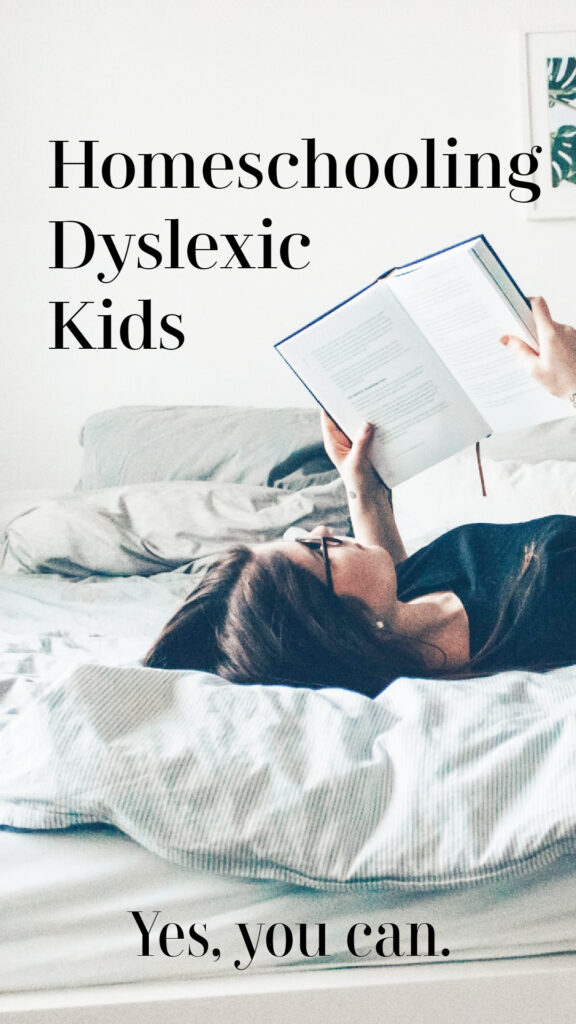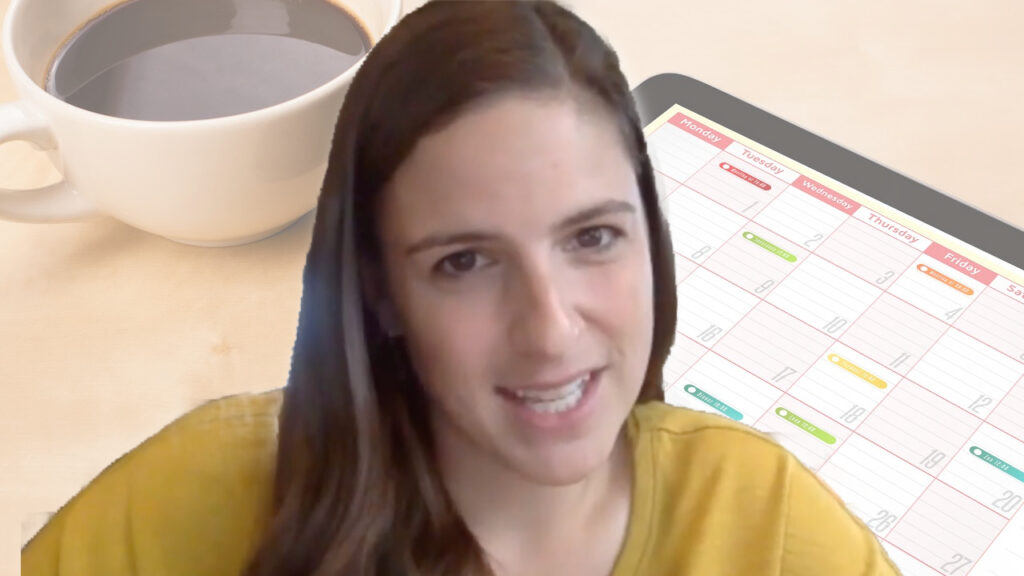Written by Abby Wahl

Abby homeschools her five kids on a family sheep ranch in the beautiful Willamette Valley of Oregon. Four of her kids are dyslexic, yet she has helped them each become readers by paying attention and not giving up.
Abby is a cohost of the Scholé Sisters podcast and can be found helping moms further their own education inside Scholé Sistership.
Find other articles by Abby
I had a lot of guilt about my kids’ dyslexia diagnosis at first. When you discover that you have a child or children with learning disabilities, it can be a painful realization, one that comes with many questions. Incomplete or circumstantial answers only makes it harder to navigate. I know, because I’ve been through that process multiple times.
You can help your children not only learn how to read, but how to enjoy reading. Dyslexia and other learning disabilities make homeschooling more than a challenge. For the parent and student, learning feels impossible. But it isn’t. You can do it.
Diagnosing dyslexia is only the beginning of a long and foggy process. It can feel frustrating. The doubt, fear, and guilt can be overwhelming. Reading and researching about atypical brains can quickly make you feel completely inadequate to help your child. Worse, it can make you feel like a bad parent for not detecting it earlier.
When I realized my kids were not just being difficult, I read all that I could, but at first researching didn’t help. I read in many books that early detection and intervention are paramount to helping a child succeed. I read that intervention for 3 and 4 year olds proved to be most beneficial, yet my kids were much older when we realized they needed more drastic measures.
Discovering my kids were dyslexic
I didn’t realize the extent to which my children would struggle at three or four or even eight and nine. We diligently practiced phonics (which they promptly forgot), and I read aloud (which they loved and narrated without issue). We did school and enjoyed learning, but my kids didn’t pick up books for fun.
My kids were learning, but not in a typical way. At times I still feel guilty for not recognizing “the signs.”
Many children learn to read later than five or six. My own husband has siblings that didn’t read until much later, so we didn’t worry. One of my kids was reading by age four, but preferred to be read to. At eight he began reading novels unprompted. My other children did not take to reading like fish take to water. They would practice and practice phonics, spelling, and sight words with little noticeable effect. If we skipped a week, all I thought they’d learned would be mostly forgotten. We were all frustrated.
We tried many different programs and each did help some, but my kids never achieved fluency. We all became more and more discouraged. We firmly believe that hard work is rewarded, but in this instance working harder was causing us to hate reading practice.
Dyslexia and other learning disabilities are always on a spectrum. There is no “typical” dyslexic person, and I have found that some of the typical “signs” do not apply to my kids at all. For example, many dyslexic children struggle with their bodies and physical movements and milestones (delayed or skipping crawling, balance and coordination, fine motor skills and spatial awareness), but my kids do not.
One of my kids would write notes and loving messages which we had to hold it up to a mirror in order to read. The reflection in the mirror was completely legible. Some of my kids would write from the bottom up (whereas handwriting is supposed to be top down). Some would reverse and transpose numbers and letters, but not whole words. Their phonetic spelling and attempts to sound out words would be hilariously creative. Each of these were clues I didn’t pick up on.
There are many other signs that your child may have dyslexia or other learning struggles, and most parents are not trained to catch or identify these subtle signs.
I have four left-handed children, another potential clue. Only about 10% of the population is left handed. Some studies suggest that left-handed students are 11 times more likely to have dyslexia.
There is also a genetic component to dyslexia. If one parent has dyslexia, a child will have a 50% chance of having dyslexia. If both parents have it, then the odds are even higher.
So what can we do?
When you realize your kid is dyslexic
First, we need to thank God for learning struggles.
I did not thank God for many years. I did not give thanks for this circumstance with my kids or in my homeschool.
I rejoiced when my kids made progress, and I thanked God for people and products that helped us with learning.
But mostly I was praying for a solution, a method, a program, a diet change, a magic pill to eliminate “the problem.”
But dyslexia isn’t a “problem” with a neat and tidy solution. It is a gift given to my children and our family from His fatherly hand. I praise God for his wisdom in this circumstance. I don’t know what the big picture is, but I do know that He will be glorified.
My best advice is to be patient. This can be a painful patience. It is a long road, with many setbacks and obstacles to overcome.
It will look like nothing is improving for months and months and then suddenly a big jump happens. There will be peaks and valleys, but generally progress will look a lot like a plateau.
Stay the course. In Corinthians we are told what genuine love looks like. Patience is part of love. The KJV translation calls it long-suffering, and that has been my experience.
What didn’t help my dyslexic kids
Most advice out there is geared toward early detection and public school programs. They do not take into account homeschoolers, nor people with limited budgets.
Finding a specialist can prove challenging. The nearest location for us was a two hour drive and required weekly appointments. It was not feasible for me to take 5 kids and wait for three hours for the therapy.
We hired a local reading tutor for a year, and it was very expensive. My child was highly motivated and worked hard, but we did not see much improvement.
Teaching kids with dyslexia
Here are some great books and tools that have helped my children and my family make progress.
The Gift of Dyslexia by Ronald Davis
This is by far one of the most encouraging books for parents. Many others I have read are discouraging because they talk mostly about early intervention (pre-school), professionals and specialists, and public school programs. Instead, this book shows the bright side of dyslexia and gives hope.
There are many, many successful and famous people that had learning disabilities. They’ve gone on to read, invent, explore, create, have amazing adventures and even write books. It’s so helpful for dyslexic kids to know that and hear those stories.
The Logic of English by Denise Eide
Recently a good friend recommended a book, Uncovering the Logic of English by Denise Eide.
Her children are good readers but struggled with spelling. After two months with Eide’s program, she has seen dramatic improvement in reading speed and correct spelling. We purchased the intensive phonics program called Logic of English Essentials.
This is especially a great program for kids who need to understand the why behind phonics and takes them through the logical rules, like why there is a “gh” in laugh instead of an “f.” This program is for anyone that needs help with reading fluency and spelling.
They have free online teacher training explaining the program and helping parents and teachers learn and implement the program. I have already learned so much.
Looking for Heroes by Aidan Colvin
This book has been a great read aloud and an encouragement to my kids.
It is written by a young man with dyslexia who wrote letters to famous people with dyslexia. He then shares their responses. It is very inspiring.
Supplement with DHA 500
DHA, also known as fish oil, helps with brain help. The NOW brand is inexpensive and high quality.
Most of us don’t eat enough fish and this supplement is a great way to support healthy brains.
The Nemecheck Protocol
The Nemecheck Protocol was designed to help heal autism, but works to improve brain help and cognitive function overall. My children do not have autism, but we are following this simple protocol to help with cognitive function.
My good friend Brandy Vencel, who is into this kind of stuff and has been following the protocol for years now, has this to say about the book: “It might sound a little over the top to say “Fact #1: miracles do happen” at the top of your book, but not if i you are Dr. Nemechek. To say this book is changing lives is an understatement. I keep promising to write about it in detail — and really I will one day. But I’m not quite ready to share. For now, all I can say is: if you are concerned about yourself or one of your children, buy this book and do this protocol. By “concerned” I mean things like memory function, attention problems, etc. By “do this protocol” I mean go all in, even when it asks you to do things that sound radical, like dropping all your supplements.”
Brain Integration Therapy by Dianne Craft
Faithfully following this protocol has been the key to all our improvement over the last two years.
I think everyone could benefit from the exercises taught by Dianne Craft, even if you don’t have severe learning struggles.
Some of the exercises she has you perform are the same used by professional athletes to improve coordination and agility.
The manual will cost you around $80, but I would pay much more for the program, because it is worth it. I also have a few of the DVDs, which were really helpful in explaining how the dyslexic brain works, how to diagnose dyslexia issues, and how to encourage dyslexic students.
This program has been life changing. We do our “brain exercises” every school day in Morning Time.
Using computer-based learning to catch students up
Because we had to put so much time into reading and therapy, and because learning was a struggle, my dyslexic kids were often “behind” in some subjects. We were doing what was most important at the time, so I tried not to let it worry me.
As the Brain Integration Therapy program began to help my students’ brain make connections, they were ready for remedial work to catch up to grade level. The therapy allowed them to finally able to put all the short term learning into the long term memory and are making progress in sounding out words, spelling correctly, and retaining phonics.
For remedial reading and spelling, we used Touch Type Read Spell.
We also used Ultimate Phonics from Spencer Learning. It is a boring program with no games, simple and straightforward. My most resistant child told me he thinks this program is really helpful. That recommendation counts for a lot.
Other Practices to Help Dyslexic Kids with Schoolwork
- We listen to the audio Bible and we all follow along with the narrator.
- We practice reading aloud daily.
- I assign 30 to 45 minutes of reading a day.
- I put close captions on movies and shows.
- They do Ultimate phonics and TTRS every day.
- We do Brain Exercises (BIT) each school day and I meet with them one on one weekly for a longer session.
- We practice spelling forwards and backwards so that they picture the word in their mind.
- They do two written narrations daily. I do not correct their spelling or grammar, they can ask me how to spell words. I will write words that I think they will need on a chalkboard.
- They practice handwriting daily.
We also have composition blocks where we practice writing essays. We brainstorm and outline together, then they write rough drafts. After the draft is ready, we go back and edit, correct, and type the paper.
Composition practice is now possible because we have improved enough to advance to this type of work.
I think Andrew Pudewa’s Institute for Excellence in Writing is a great program if you want structure, clear teaching, and engaging content. My kids were able to jump into this easily after years of simple oral and written narrations. Plus, they enjoy the lessons.
Homeschool Mom, Stay the Course!
I have learned so much over the past few years, and I am still learning. Like myself, you might be encouraged by Sarah Mackenzie’s Read Aloud Revival episode on how to know if your child has dyslexia and what to do if so.
Some of my children may never have an easy time and enjoy reading, but they have come a long way. They do love stories, though, and there are ways to consume books that do not involve eyes interpreting print.
I read much of their school lessons aloud. I encourage them to listen to audiobooks, and I am slowly requiring more and more independent reading and work.
There are days that include anger and tears, frustration and feeling like failures, but we are overcoming some of the obstacles.
I was able to meet Cindy Rollins last year when she spoke at a conference I attended. In her last talk she made a point that it is a disservice to our children to remove all the obstacles and struggles in their paths.
It seems counterintuitive not to make the path easy and as smooth as possible. If we make everything easy for our kids, however, they will be hobbled. Struggles seem so unpleasant at the time, but they serve a higher purpose.
Faithfully doing what you can to assist and support your kids is a parent’s calling, but we must not shield them from the reality of learning struggles or shelter them from hard work.
We must allow them to overcome adversity and let them toil and persevere and not grow weary of doing good.

HOMESCHOOL AUDIT
Make next year better based on how this year went.
Download the free homeschool audit and use this year’s experience to make next year better.













Another help for Dyslexics is Susan Barton’s website (www.bartonreading.com) and http://www.dys-add.com. I used the Barton Reading and Spelling program with my daughter and it was a true God-send. So much improvement!
Thanks for this post, Abby! I’ve been wondering if my youngest child is dyslexic (she’s 7 years old), though neither my husband nor me or any of our family members are dyslexic. Learning to read has been a struggle and I worry about her going back to public school in the fall. All these resources give me lots of options to consider- thank you!
Do you recommend buying the entire Dianne Craft package? Or is that not necessary. I’m just wondering what to invest in at this point… I’m a believer in brain balance and functional neurology so this designated with me. We have done some midline excersises and stimulation into the right side of the body (jumping on the right foot, tossing a bean bag with the right hand and eye tracking exercises). Does the program add to this? Or am I being redundant by buying this program.
I started with this https://diannecraft.org/product/brain-integration-therapy-manual/
I also bought her write 8 pages.
It really helped us with a systematic approach that she suggests. She was a OT in a school for over 30 years, she picked the most helpful exercises and we could do them in under 15 minutes daily. And once a week for the intensive session I would spend about an hour (total) to meet with each of my kids individually.
My oldest is 10. He can read, but he struggles to gain any big picture view of what he is reading. And if he made wrong assumption looking at a picture at the beginning of the story, he is completely lost trying to read the chapter. I’m gonna have to look into all this! If you have any thoughts, would love to hear them.
I really think these brain exercises (what my family calls them) would be beneficial to everyone.
I think the first thing to understand is that dyslexia is a weakness in auditory processing (not visual) and the sound to symbol connection in the brain. I initially went the route of Dianne Craft’s BIT exercises and supplements, but I honestly cannot say if they helped my son’s dyslexia or not. Maybe a little, and we did them religiously for several years. I will say that her right-brain phonics cards were amazing though. He could finally remember the sounds of the symbols. We then used her right-brain phonics book. It got him started. It wasn’t until we did Logic of English Essentials though that my son finally made the leap to truly learning to read and spell, and I began reading everything I could find about the Orton Gillingham method. Because of our experience, I became a certified dyslexia practioner with Children’s Dyslexia Centers.
All that to say, Dianne Craft is not something I recommend, especially not her reading program. It is based on visual methods of memorizing, and that’s an extremely limiting band-aid. The BIT book is ok, but may only be a small part of the issue.
What I consider the best practice is a combination of OG with structured word inquiry, based on the science of reading. In other words, phonemic awareness, explicit phonics instruction, and word study and morphology. My top recommendation to fellow home schoolers is a company called Rooted in Language. They have parent education classes that are absolutely amazing. They come from a speech pathology background with 30+ years of working with dyslexia and dysgraphia. They do amazing work with parents and their children. Please check them out and start listening to their podcasts and watching their webinars on fb. Their techniques are solid and highly effective, and they have great products. Logic of English is my second choice as a solid reading/spelling program, but Rooted is tops, integrating all of language arts together as each part informs the other. Their functional grammar approach is excellent and they integrate word study right from the beginning. Rooted in Language is relatively new to the scene, so I like to get their name out there. What they do corresponds with all my training plus those who are top in the dyslexia field.
I have just been thinking of using the Nemechek Protocol with my almost 12 year old son with dyslexia. I would love to hear more of your thoughts on using this protocol with dyslexic kids!